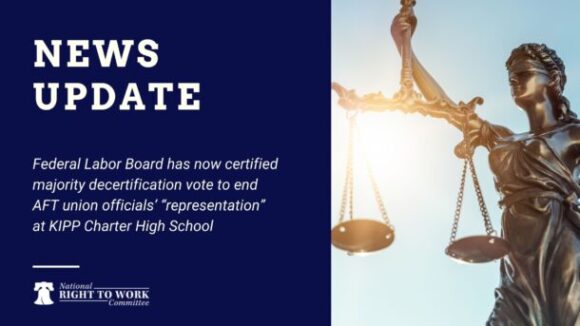Will Team Biden Weaponize Workers’ Pensions?
Big Labor abuse of worker pension and benefit funds as a means of advancing union bosses’ self-aggrandizing policy objectives is a familiar phenomenon.

Dane County Circuit Judge William Foust obviously feels very strongly that government labor policy should empower union bosses to cut deals with employers forcing employees subject to “exclusive” union bargaining in the workplace to pay union fees, or be fired. However, judging by his April 8 opinion striking down Wisconsin’s Right to Work law, Foust is far from confident of his ability to offer a legal justification for imposing his preferences on employees and businesses throughout the Badger State that actually fits the facts. (See the link below to read a news account about the ruling, which will soon be appealed and is not expected to be upheld.)
As the attorney general of Wisconsin and attorneys for the National Right to Work Legal Defense Foundation and the Wisconsin Institute for Law and Liberty (WILL) explained to Foust in briefs opposing union lawyers’ move to reinstitute forced financial support for unions in the Badger State, the U.S. Supreme Court unanimously declared in 2007 that union bosses have no “constitutional right” to nonmembers’ dues or fees. In a portion of his Davenport v. Washington Education Association opinion that was joined by all the other justices, including Clinton appointees Ruth Bader Ginsburg and Stephen Breyer, the late Justice Antonin Scalia wrote: “The agency-fee cases did not balance constitutional rights . . . because unions have no constitutional entitlement to nonmember-employees’ fees.”
It would have been extraordinarily difficult, for certain, for Foust to explain how he could be right that Wisconsin’s Constitution entitles union bosses to forced fees from nonmembers when the U.S. Supreme Court has already unanimously declared that the federal Constitution doesn’t do that. And Foust didn’t even try. Instead, his opinion never acknowledged the existence of Davenport, a case won by Right to Work Foundation attorneys.
Another gross shortcoming in Foust’s opinion is his false claim that labor policy in Wisconsin prohibits contracts in which union officials represent their members only, and authorizes only “exclusive” representation in which union members and nonmembers alike are subject to the job conditions negotiated by the union.
The reality is that, nearly 80 years ago, a High Court majority led by Justices Charles Evans Hughes explicitly found in Consolidated Edison v. National Labor Relations Board that, absent the existence of a monopoly-bargaining deal in a workplace, contracts designating a particular union as the bargaining agent only “for those employees who are its members” fall into the framework of protected activity under Section 7 of the National Labor Relations Act (NLRA) and are certainly permissible. Subsequent High Court rulings have confirmed that Hughes’ 1938 decision applies as well to the NLRA as amended by Taft-Hartley.
The brief submitted to Foust jointly by Foundation and WILL attorneys explicitly cited Consolidated Edison as well as a 2014 Indiana Supreme Court ruling that referenced this decision. This brief also noted that even if union lawyers are correct in claiming that Wisconsin labor statutes and case law prohibit members-only bargaining, any such prohibition is preempted by the NLRA and, therefore, inoperative. And the attorney general’s brief quoted the Indiana High Court opinion regarding the permissibility of members-only bargaining.
Yet Foust’s opinion contended, without even mentioning Consolidated Edison or acknowledging the NLRA preempts state law, that there is no way Wisconsin union bosses could “evade . . . exclusive representative” status and still negotiate contracts. This is completely untrue. And it is highly doubtful even Foust believes what he wrote.
If he did, wouldn’t he have at least tried to explain how his contention could be reconciled with Consolidated Edison and other related Supreme Court precedents?

Big Labor abuse of worker pension and benefit funds as a means of advancing union bosses’ self-aggrandizing policy objectives is a familiar phenomenon.

What impact does handing a union monopoly power to deal with your employer on matters concerning your pay, benefits, and work rules have on your pay?

Federal Labor Board has now certified majority decertification vote to end AFT union officials’ “representation” at KIPP Charter High School